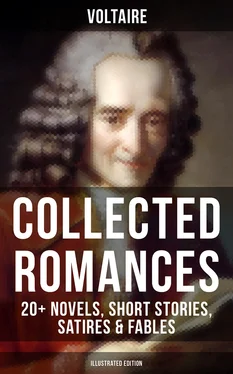There was at the table a person of learning and taste, who supported what the marchioness had advanced. They next began to talk of tragedies. The lady desired to know how it came about that there were several tragedies, which still continued to be played, though they would not bear reading? The man of taste explained very clearly how a piece may be in some manner interesting without having a grain of merit. He showed, in a few words, that it is not sufficient to throw together a few incidents that are to be met with in every romance, and that to dazzle the spectator the thoughts should be new, without being far-fetched; frequently sublime, but always natural; the author should have a thorough knowledge of the human heart and make it speak properly; he should be a complete poet, without showing an affectation of it in any of the characters of his piece; he should be a perfect master of his language, speak it with all its purity, and with the utmost harmony, and yet so as not to make the sense a slave to the rhyme. “Whoever,” added he, “neglects any one of these rules, though he may write two or three tragedies with tolerable success, will never be reckoned in the number of good authors. There are very few good tragedies; some are idyls, in very well-written and harmonious dialogue; and others a chain of political reasonings that set one asleep, or else pompous and high-flown amplifications, that disgust rather than please. Others again are the ravings of a madman, in an uncouth style, unmeaning flights, or long apostrophes to the deities, for want of knowing how to address mankind; in a word a collection of false maxims and dull commonplace.”
Candide listened to this discourse with great attention, and conceived a high opinion of the person who delivered it; and as the marchioness had taken care to place him near her side, he took the liberty to whisper her softly in the ear and ask who this person was that spoke so well. “He is a man of letters,” replied her ladyship, “who never plays, and whom the abbé brings with him to my house sometimes to spend an evening. He is a great judge of writing, especially in tragedy; he has composed one himself, which was damned, and has written a book that was never seen out of his bookseller’s shop, excepting only one copy, which he sent me with a dedication, to which he had prefixed my name.” “Oh the great man,” cried Candide, “he is a second Pangloss.”
Then turning towards him, “Sir,” said he, “you are doubtless of opinion that everything is for the best in the physical and moral world, and that nothing could be otherwise than it is?” “I, sir!” replied the man of letters, “I think no such thing, I assure you; I find that all in this world is set the wrong end uppermost. No one knows what is his rank, his office, nor what he does, nor what he should do. With the exception of our evenings, which we generally pass tolerably merrily, the rest of our time is spent in idle disputes and quarrels, Jansenists against Molinists, the parliament against the Church, and one armed body of men against another; courtier against courtier, husband against wife, and relations against relations. In short, this world is nothing but one continued scene of civil war.”
“Yes,” said Candide, “and I have seen worse than all that; and yet a learned man, who had the misfortune to be hanged, taught me that everything was marvellously well, and that these evils you are speaking of were only so many shades in a beautiful picture.” “Your hempen sage,” said Martin, “laughed at you; these shades, as you call them, are most horrible blemishes.” “The men make these blemishes,” rejoined Candide, “and they cannot do otherwise.” “Then it is not their fault,” added Martin. The greatest part of the gamesters, who did not understand a syllable of this discourse, amused themselves with drinking, while Martin reasoned with the learned gentleman; and Candide entertained the lady of the house with a part of his adventures.
After supper the marchioness conducted Candide into her dressing-room, and made him sit down under a canopy. “Well,” said she, “are you still so violently fond of Miss Cunegund of Thunder-ten-tronckh?” “Yes, madam,” replied Candide. The marchioness said to him with a tender smile, “You answer me like a young man born in Westphalia; a Frenchman would have said, ‘It is true, madam, I had a great passion for Miss Cunegund; but since I have seen you, I fear I can no longer love her as I did.’ ” “Alas! madam,” replied Candide, “I will make you what answer you please.” “You fell in love with her, I find, in stooping to pick up her handkerchief which she had dropped; you shall pick up my garter.” “With all my heart, madam,” said Candide, and he picked it up. “But you must tie it on again,” said the lady. Candide tied it on again. “Look ye, young man,” said the marchioness, “you are a stranger; I make some of my lovers here in Paris languish for me a whole fortnight; but I surrender to you at first sight, because I am willing to do the honors of my country to a young Westphalian.” The fair one having cast her eye on two very large diamonds that were upon the young stranger’s finger, praised them in so earnest a manner that they were in an instant transferred from his finger to hers.
As Candide was going home with the abbé he felt some qualms of conscience for having been guilty of infidelity to Miss Cunegund. The abbé took part with him in his uneasiness; he had but an inconsiderable share in the thousand pieces Candide had lost at play, and the two diamonds which had been in a manner extorted from him; and therefore very prudently designed to make the most he could of his new acquaintance, which chance had thrown in his way. He talked much of Miss Cunegund, and Candide assured him that he would heartily ask pardon of that fair one for his infidelity to her, when he saw her at Venice.
The abbé redoubled his civilities and seemed to interest himself warmly in everything that Candide said, did, or seemed inclined to do.
“And so, sir, you have an engagement at Venice?” “Yes, Monsieur l’Abbé,” answered Candìde, “I must absolutely wait upon Miss Cunegund;” and then the pleasure he took in talking about the object he loved, led him insensibly to relate, according to custom, part of his adventures with that illustrious Westphalian beauty.
“I fancy,” said the abbé, “Miss Cunegund has a great deal of wit, and that her letters must be very entertaining.” “I never received any from her,” said Candide; “for you are to consider that, being expelled from the castle upon her account, I could not write to her, especially as soon after my departure I heard she was dead; but thank God I found afterwards she was living. I left again after this, and now I have sent a messenger to her near two thousand leagues from here, and wait here for his return with an answer from her.”
The artful abbé let not a word of all this escape him, though he seemed to be musing upon something else. He soon took his leave of the two adventurers, after having embraced them with the greatest cordiality. The next morning, almost as soon as his eyes were open, Candide received the following billet:
“My Dearest Lover — I have been ill in this city these eight days. I have heard of your arrival, and should fly to your arms were I able to stir. I was informed of your being on the way hither at Bordeaux, where I left the faithful Cacambo, and the old woman, who will soon follow me. The governor of Buenos Ayres has taken everything from me but your heart, which I still retain. Come to me immediately on the receipt of this. Your presence will either give me new life, or kill me with the pleasure.”
At the receipt of this charming, this unexpected letter, Candide felt the utmost transports of joy; though, on the other hand, the indisposition of his beloved Miss Cunegund overwhelmed him with grief. Distracted between these two passions he took his gold and his diamonds, and procured a person to conduct him and Martin to the house where Miss Cunegund lodged. Upon entering the room he felt his limbs tremble, his heart flutter, his tongue falter; he attempted to undraw the curtain, and called for a light to the bedside. “Lord, sir,” cried a maid servant, who was waiting in the room, “take care what you do, Miss cannot bear the least light,” and so saying she pulled the curtain close again. “Cunegund! my dear Cunegund!” cried Candide, bathed in tears, “how do you do? If you cannot bear the light, speak to me at least.” “Alas! she cannot speak,” said the maid. The sick lady then put a plump hand out of the bed and Candide first bathed it with tears, then filled it with diamonds, leaving a purse of gold upon the easy chair.
Читать дальше












